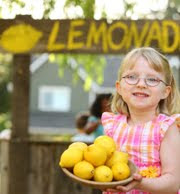 As the weather slowly starts to warm across the country, a few industrious children might put aside their game consoles and opt for something a bit more enterprising like opening a lemonade stand (assuming regulators allow them).
As the weather slowly starts to warm across the country, a few industrious children might put aside their game consoles and opt for something a bit more enterprising like opening a lemonade stand (assuming regulators allow them). Nowadays, there are only a few, maybe one per city. But let's assume for a minute that more children were ambitious. Let's say all of them.
Can you imagine? In every neighborhood, down every block, and in every driveway, folding tables and handmade signs would color the entire city yellow with packets of Kool-Aid piling up in trash cans. Except, Kool-Aid packets wouldn't pile up. With so many of the same choices, there would be nothing to help the would-be consumer to distinguish which stand to visit.
Marketing Is Much More Than Numbers.
The only possible way for any of these kids to manage a successful lemonade stand would be to develop specializations. There are dozens of ways to do it. They could specialize with a focus on the market, customer, product, or marketing mix.
• Demographic specialist. Perhaps one child would specialize in an older demographic, turning on a portable stereo and playing old hits from the 1980s.
• Product specialist. Maybe another child skips the Kool-Aid mix and decides to only use real lemons handpicked at the local farmer's market.
• Packaging specialist. Perhaps another child decides to skip Dixie cups and only serve the lemonade in frosted glasses that can be kept as long as the customer is willing to pay a premium.
 • Service specialist. Maybe another child decides that they can afford to invest in baking sugar cookies, which are offered alongside the lemonade, distinguishing them from the various vendors competing for attention.
• Service specialist. Maybe another child decides that they can afford to invest in baking sugar cookies, which are offered alongside the lemonade, distinguishing them from the various vendors competing for attention. • Channel specialist. Perhaps yet another child makes it easier for customers to order their lemonade and introduces a free delivery service that brings the lemonade right to their doorsteps.
• Discount specialist. Maybe one of the children, especially facing pressure to meet all these growing specializations, decides to mark down their product five cents.
• Geographic specialist. Perhaps one of the children emphasizes the location of their lemonade stand, offering up that a percentage of their sales will be donated to a local cause such as cleaning up the neighborhood park.
• Disruption specialist. And yet another child decides that the competition is much less fierce if they decide to offer cranberry juice instead.
• Product-line specialist. Perhaps another child recognizes that the organic lemonade shop is struggling to keep up with business so rather than selling lemonade to consumers, they focus on squeezing organic lemons to help them keep up.
• Broadcast specialist. Maybe another child decides that they can leverage the power of their brand by franchising their lemonade stand to nearby neighborhoods and thus creating a consistent brand message.
And the list goes on, with the underlying premise being that all companies are dependent on whether they are a market leader, challenger, follower, or uniquely specialized as these various lemonade stands became.
Sure, not all of them will be successful but more of them will be successful than if they all tried to produce the same product. And most costumers will be happy because they will be given an increasing number of choices that all the customers will enjoy.
A Quick Look At Black Hat Marketing Tactics.
Of course, there will be a few children who might not appreciate any competition. And they might engage in any number of tactics that aren't designed to benefit the customer but instead diminish the the competition's ability to sell products.
• Legislative disruption. One child might, for example, lobby legislators to pass a law requiring special insurance that makes it more expensive for the channel specialist to employ drivers.
 • Fire sale disruption. Perhaps another child doesn't cut his price by a nickel but decides to sell it for a nickel for an extended period of time, taking on substantial debt until successfully forcing competitors out of business.
• Fire sale disruption. Perhaps another child doesn't cut his price by a nickel but decides to sell it for a nickel for an extended period of time, taking on substantial debt until successfully forcing competitors out of business. • Purchase disruption. Maybe another child has more money saved up and buys up all the other lemonade stands on the block for no other reason than to curb competition.
• Recommendation exchange. Maybe two or three children team up and praise each other's lemonade while discounting all the other stands in the neighborhood.
All four of these tactics are viable approaches to businesses and are practiced daily. They are not necessarily ethically challenged in every case, but it's easy to see how they might disrupt the marketplace and work against consumer interest. In some cases, such actions create a marketplace very much like concept we started with when every child was selling virtually the same product.
Where Marketing Naturally Meets Social Media.
When most people think of marketing, they immediately think sales. But marketing isn't about sales at all. It's about product differentiation, especially among niche companies.
When you look back at some of the most successful marketing stories in history, almost none of them have anything to do with sales. In fact, those that abandoned product differentiation for sales have since lost some of their initial luster.
Sure, the ideal niche mix is to find an area of specialization that has a strong enough interest and reasonable growth potential, which will result in sales, but sales don't have to be the primary objective. Finding the right consumers make a bigger impact.
This plays out in social media too. Right now, most people are focusing on new numbers instead of sales — connections, shares, comments, etc. that somehow indicate visionary influence — but none of those things will really bear out over the long term as much as building the right relationships.
 In other words, the organic lemonade specialists might not be able to capture all lemonade lovers but they might be able to capture a significant portion of organic lemonade lovers. It might even be to their determent to target all lemonade lovers, people who will complain about the higher price point, bemoan the lack of delivery, or want cranberry juice served too.
In other words, the organic lemonade specialists might not be able to capture all lemonade lovers but they might be able to capture a significant portion of organic lemonade lovers. It might even be to their determent to target all lemonade lovers, people who will complain about the higher price point, bemoan the lack of delivery, or want cranberry juice served too. Social media has grown up. In the years ahead, expect to see more attention being paid to the marketing side of social media. Companies won't celebrate crossing the one million fan mark as much as they will celebrate crossing the 80-20 percent split between loyal customers and potential buyers.
The same can be said about bloggers too. Content is a product of sorts and the last thing consumers want or need is the same content on every single site. You can differentiate a blog much like companies differentiate their products.
Companies might have to approach any social media campaigns the same way too. Twenty juice companies writing about the industry is boring. Twenty juicers writing about different but related topics that appeal to their demographic might be noticed.

















